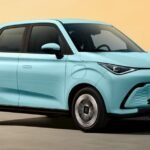Li Auto, a Chinese automaker listed on NASDAQ, is making bold moves in the field of artificial intelligence (AI) by establishing two new robotics departments – space robotics and wearable robotics. According to a report by local media outlet LatePost, the company recently announced this decision in an internal memo.
The space robotics department will be led by Shuai Yifan, who previously held positions as Li Auto’s product planning director and senior product director. On the other hand, the wearable robotics department will be headed by Zhang Wenbo, a former software product manager at Li Auto. Both Shuai and Zhang will report directly to Fan Haoyu, the senior vice president and head of the product department at Li Auto.
While Li Auto has not provided a specific reason for creating these new departments, it is believed that this move is part of the company’s broader AI strategy. Li Xiang, the founder, chairman, and CEO of Li Auto, has previously stated that cars are evolving from traditional transportation tools into space robots of the AI age.
In addition to space robotics, Li Auto is also exploring the development of wearable devices, including smart glasses. At a strategic meeting last fall, company management reportedly discussed the necessity and feasibility of developing their own smart glasses. Industry experts suggest that smart glasses could be the next big consumer hardware trend after smartphones.
Li Auto’s strong financial position as one of China’s leading new automotive startups allows it to invest in cutting-edge technologies like AI and robotics. In the first quarter of 2025, the company reported a net profit of RMB 646.6 million ($89.9 million), representing a 9.4% year-on-year increase. Although this figure was down 81.7% from the previous quarter, Li Auto’s cash reserves stood at RMB 110.7 billion as of March 31.
Overall, Li Auto’s foray into space robotics and wearable robotics signifies its commitment to innovation and staying ahead in the rapidly evolving automotive industry. With a strong focus on AI and emerging technologies, the company is positioning itself for success in the future of mobility.







